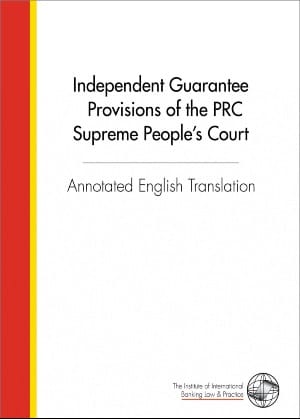Understanding and Application of the Right of Recourse Under the PRC Supreme People’s Court’s Guarantee Rules
Exploring the guarantor's right of recourse, analyzing legal concepts, international banking practices, and banking structures in China. Specifically guarantees and counter guarantees.

This article is written in response to an article and a recent law case. The article is “Discussion on Issues Relating to Independent Guarantee” published by well-known PRC Professor Wang Liming (“Professor Wang’s article”),1 which addresses the important matter of recourse and right of recourse relating to independent guarantees. The case involves a decision settled by the Supreme People’s Court (SPC).2 Both relate to Article 14 of Provisions of the Supreme People’s Court of the People’s Republic of China on Several Issues Concerning the Trial of Disputes over Independent Guarantees (“PRC Independent Guarantee Provisions”) issued by SPC on 1 December 2016.3
In particular, the article and case consider: (1) The right of recourse against the applicant under the independent demand guarantee (“DG”) by the guarantor who has paid the guarantee amount to the beneficiary; and (2) the right of recourse against the counter-guarantor under the counter DG by the guarantor who has paid the beneficiary.
1. Issue of Guarantor’s Right of Recourse under an Independent Guarantee
1.1 Academic Issues
When analyzing “Guarantor’s Right of Recourse” in Section III of his article Wang indicated:
“Similar to the guarantor under [a] general guaranty, an independent guarantor also has a right of recourse. After assuming guarantee responsibilities, the independent guarantor also has the right of recourse against the principal debtor. In the event that the independent guarantor exercises the right of recourse, the debtor shall be unconditionally obliged to repay the amount paid by the guarantor. In practice, the debtor usually has deposits or other guarantees [with] the independent guarantor (usually the bank), and the bank as the independent guarantor can deduct the amount directly from the deposit, so as to realize its right of recourse.”
It appears that Professor Wang believes that the guarantor has a right of recourse after paying the beneficiary upon its presentation of a complying demand.
1.2 Right of Recourse under Independent DGs in International Banking and Commercial Practice
1.2.1 “Recourse” and “Right of Recourse” as Legal Concepts under an Accessory Guarantee
In PRC Security Law (now the new Civil Code), after a guarantor or guarantor bank has already fulfilled its obligations to the creditor under an accessory guarantee, it has a right of recourse against the guarantee applicant or other guarantor who issues a guarantee. However, “recourse” or the “right of recourse” is not a concept in the legal field of independent guarantees. Because transactions between the creditor and the debtor under the underlying contract and an independent DG are independent from each other according to the independence principle. Only two parties are directly involved under an independent DG, namely the DG issuer, or guarantor bank (guarantor), and the DG beneficiary. Both the underlying contract and the Application Agreement of the issuing of an independent DG are independent of the DG itself.4 Therefore, strictly speaking, neither the applicant nor the instructing party is a party to the independent DG.5 After the guarantor of the independent DG receives complying documents presented by the beneficiary and makes payment to the beneficiary (honors), its right of recourse against the applicant or the instructing party shall be determined by the provisions of the application agreement for issuance and of the guarantee agreement for issuance between issuer and applicant, respectively. The right of recourse of the independent DG guarantor is clearly provided for in Article 9 of the PRC Independent Guarantee Provisions.6 There is no dispute about this point in legal practice, nor in past and recent cases of the SPC and local courts.7
1.2.2 DG Guarantor’s Right of Recourse against Counter-Guarantor
The PRC Independent Guarantee Provisions include the following related to recourse or the right of recourse of an independent DG issuer:
Article 1 (Paragraph 3): “Independent Guarantees may be issued upon an application made by a Guarantee Applicant or instructions given by another financial institution (“Instructing Parties”). Where an Issuer issues an Independent Guarantee upon instructions, the Issuer may require the instructing party to issue an Independent Guarantee in favor of the Issuer, so as to assure the Issuer’s reimbursement.”
Article 2: “For the purpose of these Provisions, “Independent Guarantee Disputes” refers to disputes arising out of the issuance, revocation, amendment, transfer, payment and reimbursement and so forth of Independent Guarantees.”
Article 9: “The Issuer’s claim for reimbursement against the Guarantee Applicant after the Issuer has paid under the Independent Guarantee shall be supported by a People’s Court, unless there is any discrepancy in the documents presented by the Beneficiary.”
Article 14 (Paragraph 3): “Where the issuer has paid in good faith under the Independent Guarantee which has been issued upon instructions of the Instructing Party, a People’s Court shall not suspend the payment under another Independent Guarantee whose purpose is to secure the Issuer’s right to reimbursement.”
The right of recourse of the guarantor under a direct DG or the counter guarantor under a counter DG against the applicant in the preceding clauses obviously has been clarified in Article 9 and there is no dispute. The issues in dispute are the provisions of Article 1 (Paragraph 3) and Article 14 (Paragraph 3) because these provisions regard a counter DG as an independent DG issued by the instructing party to guarantee its right of recourse and an independent DG to guarantee the issuer’s right of recourse. The idea under these two provisions is clearly that the counter DG is regarded as a DG issued for purposes of safeguarding the guarantor’s right of recourse under the DG. This is precisely where disputes and disagreements arise.
2. Banking Practice and the Right of Recourse in the Independent DG Legal Relationship
2.1 Independent DG issued by Banks or Non-Bank Financial Institutions
In Chinese law, according to Article 2 of Interpretation of Supreme People’s Court on Application of the Security System under the Civil Code of the People’s Republic of China8 and Article 1 of the PRC Independent Guarantee Provisions, the entities qualified to provide an independent DG are limited to “banks or non-bank financial institutions”. Companies and individual persons cannot provide independent DGs.9













